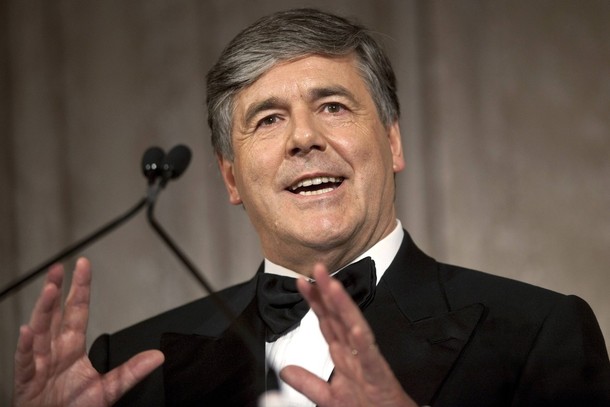 As with the venerable E. F. Hutton before him, when Joe Ackermann talks, people listen. Especially when he’s talking about fixing the problems that led to the financial crisis.
As with the venerable E. F. Hutton before him, when Joe Ackermann talks, people listen. Especially when he’s talking about fixing the problems that led to the financial crisis.
Speaking last night after he was honored with the Atlantic Council’s Distinguished Business Leadership Award last night for his extraordinary performance during the recent global meltdown, the Deutsche Bank chief executive stated the problem forthrightly: “Trust in the banking industry – my industry – has been deeply undermined. All around the world, and notably here in the United States, governments and regulators are working to re-shape the financial system. We stand at a crossroads. Decisions we take now will be critical for economic recovery, and will influence the world economy for the next generation.” But, he noted, “it’s essential to start with a dispassionate view of the banking industry. We’ve heard many passionate views. But there are two sides to this coin, and we need to look at both sides.”
While acknowledging that “mistakes were made” — perhaps the first use in Washington history of that passive phrase when the speaker wasn’t the one making said mistakes — Ackermann argued that it’s important to keep in mind that “the banking system as a whole has facilitated a period of prosperity and economic growth that was unparalleled in recent history. Capital flowed across the world faster, and more freely, than ever. Financial innovation allowed business leaders to realize their aspirations, widen their horizons, and protect themselves from risk. Most of this activity was totally unrelated to the instruments that triggered the crisis.”
So, how to both safeguard against the excesses that created the present crisis without stifling the economic growth vital to getting us out of it?
First, Ackermann cautioned, we must avoid “generalist, or sweeping restrictions to tackle specific, localized problems.” To do that, regulators and legislators must work with industry experts to identify truly bad instruments while leaving the useful ones alone.
Second, given the complex interdependence of the world economy, “Banks must be allowed to serve the interests, and aspirations of our clients, right across the globe.”
Third, we must not “undermine our global competitiveness” through foolish overreaction. “Globalization presents challenges and opportunities. We can embrace it with confidence. But to do that, we must enable — and liberate — the dynamism of our economies. You can’t do that without a fully-empowered banking system.”
Ackermann is right, of course. Deutsche Bank is proof positive that it’s possible to do creative, dynamic banking that both facilitates wider economic growth and generates tremendous profits for investors without taking stupid risks. But politicians accountable to voters who are angry at the economic devastation caused by the worst offenders — many of whom were then deemed “Too Big To Fail” and bailed out on the taxpayers’ dime — are unlikely to stop at surgical measures.
The only hopeful sign in the other direction is that there has yet to be sweeping financial reform passed. Maybe — just maybe — this has provided a cooling off period that will prevent rash legislation that provides a cure worse than the disease.
James Joyner is managing editor of the Atlantic Council. Photo credit: Reuters Pictures.
